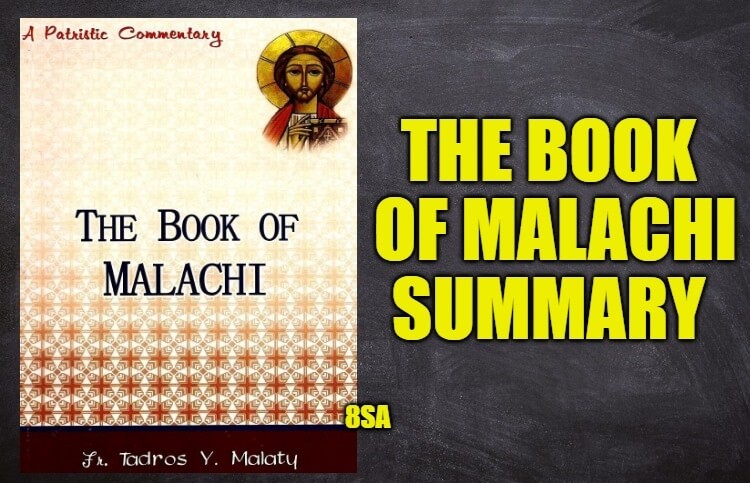What is the summary of The Book of Malachi? Information about the summary, history, themes and significance of The Book of Malachi.

“The Book of Malachi” is the last book of the Old Testament in the Bible, specifically the Tanakh, which is the sacred scripture of Judaism. It is also included in the Christian Bible as one of the prophetic books in the Old Testament. The book is attributed to the prophet Malachi, whose name means “my messenger” or “messenger of Yahweh.”
Theme:
The Book of Malachi addresses various themes and issues that were prevalent during the time of its writing. Some of the key themes include:
- Covenant and Faithfulness: The book emphasizes the importance of honoring the covenant between God and His people. It highlights the faithfulness of God and calls for the people’s commitment to worship, obedience, and righteousness.
- Priesthood and Worship: Malachi critiques the priests of his time, highlighting their negligence and lack of sincerity in carrying out their priestly duties. He calls for a return to true worship, emphasizing the need for reverence and purity in the service of God.
- Social Justice and Ethical Conduct: Malachi addresses issues of social injustice, including the mistreatment of widows, orphans, and foreigners. He emphasizes the need for fairness, honesty, and integrity in personal and societal relationships.
- Messianic Hope: The book contains messianic prophecies and hints at the coming of a future messenger who will prepare the way for the Lord. These prophecies are often associated with the coming of John the Baptist in Christian tradition.
Information:
The Book of Malachi consists of four chapters, containing a series of dialogues or disputes between God and the people. The exact dating of the book is uncertain, but it is believed to have been written during the Persian period (5th century BCE) after the Jewish exiles returned from Babylon.
Malachi’s messages serve as a call for the people to repent, return to God, and renew their covenant relationship. The book highlights the need for genuine worship, moral uprightness, and social justice. It warns of the consequences of disobedience and unfaithfulness while offering hope for restoration and blessings to those who remain faithful to God.
“The Book of Malachi” is an important scriptural text for both Jews and Christians, providing insights into the religious and social context of the time and conveying timeless lessons about faith, devotion, and social responsibility.
Summary
The Book of Malachi is the final book of the Old Testament in the Bible, and it serves as a prophetic message from the prophet Malachi to the people of Israel. The book is attributed to Malachi, whose name means “my messenger” or “messenger of Yahweh.”
The central themes addressed in the Book of Malachi revolve around the covenant between God and His people, the priesthood and worship, social justice and ethical conduct, and the hope of a coming Messiah.
The book begins with a dialogue between God and the people, where God expresses His love for Israel and reminds them of His chosen status for them as a nation. However, the people question God’s love and faithfulness, leading to a series of disputes and challenges from God. Malachi, acting as God’s messenger, delivers God’s responses and admonitions to the people.
One of the major concerns raised in the book is the negligence and insincerity of the priests in carrying out their priestly duties. Malachi accuses the priests of offering defiled sacrifices, showing partiality, and failing to teach and uphold the law. He calls for a return to true worship, emphasizing the need for reverence, purity, and sincerity in the service of God.
The book also addresses issues of social injustice and ethical conduct. Malachi condemns those who mistreat widows, orphans, and foreigners, calling for fairness, compassion, and integrity in personal and societal relationships. He warns of God’s judgment upon those who oppress the vulnerable and violate the principles of justice and righteousness.
Throughout the book, Malachi emphasizes the importance of faithfulness to the covenant and obedience to God’s commandments. He rebukes the people for their unfaithfulness, including intermarriage with foreign nations and the withholding of tithes and offerings. Malachi calls for repentance, urging the people to turn back to God and renew their commitment to Him.
In addition to addressing the contemporary issues of his time, Malachi offers glimpses of future events. He prophesies the coming of a messenger who will prepare the way for the Lord, commonly associated with the arrival of John the Baptist in Christian tradition. Malachi also speaks of a day of judgment and restoration, where the righteous will be rewarded and the wicked will face punishment.
The Book of Malachi consists of four chapters, with each chapter containing a series of dialogues and disputes between God and the people. The exact dating of the book is uncertain, but it is believed to have been written during the Persian period (5th century BCE) after the Jewish exiles returned from Babylon.
The messages conveyed in the Book of Malachi serve as a call for repentance, a reminder of God’s faithfulness, and an encouragement to remain faithful to the covenant. The book emphasizes the importance of genuine worship, moral uprightness, and social justice. It warns of the consequences of disobedience and unfaithfulness while offering hope for restoration and blessings to those who remain loyal to God.
“The Book of Malachi” holds significant religious and historical importance for both Jews and Christians. It provides insights into the religious and social context of the time and conveys timeless lessons about faith, devotion, and social responsibility.